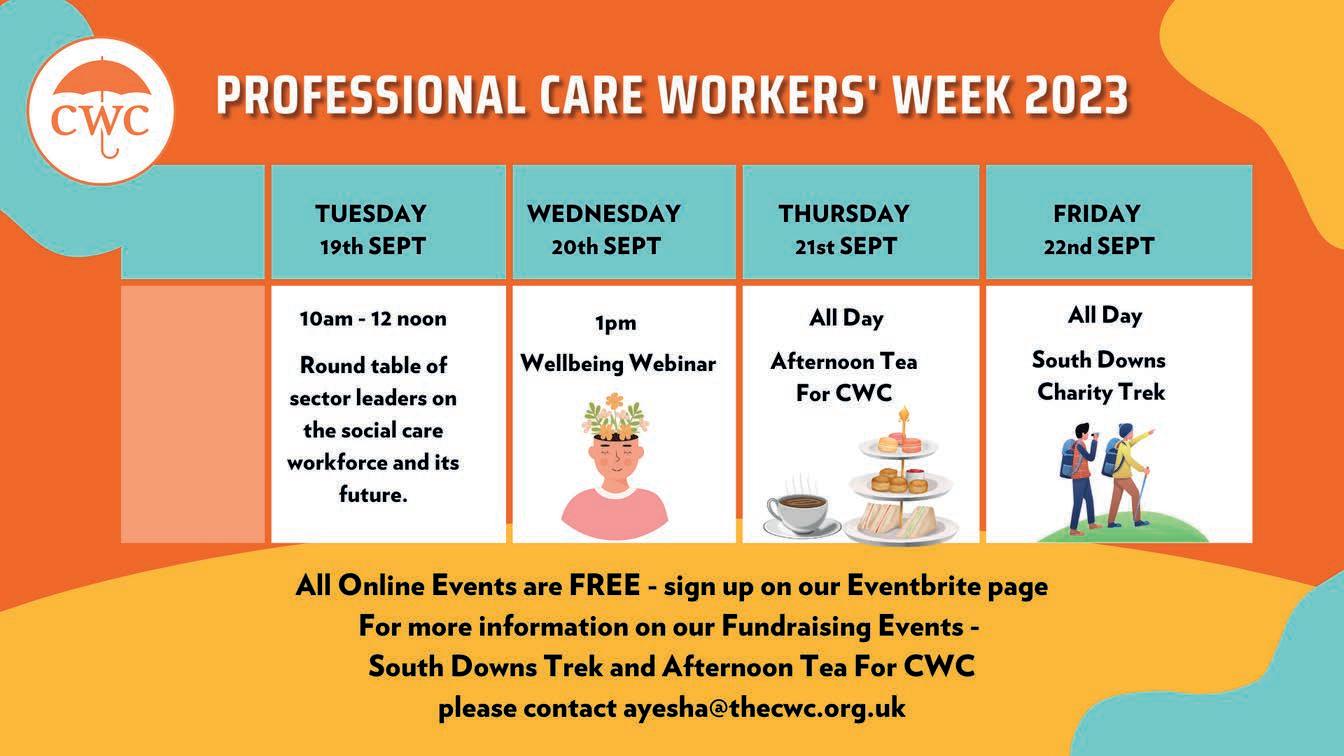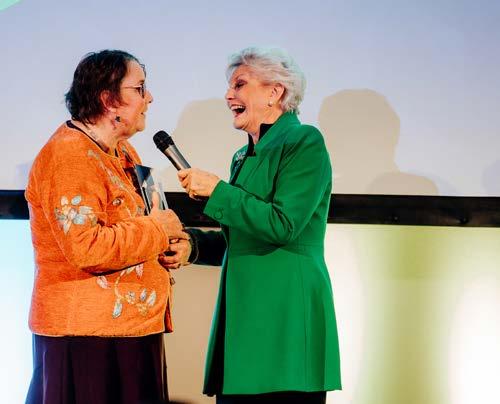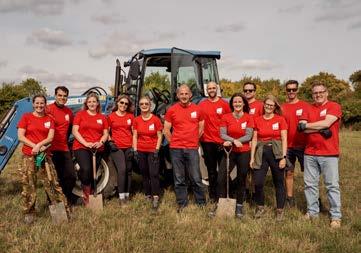FACING THE FUTURE

Raising the profile of nursing
Upskilling the workforce
Learning disability training
A global beacon Resource Finder
Could Buurtzorg work in the UK?


Raising the profile of nursing
Upskilling the workforce
Learning disability training
A global beacon Resource Finder
Could Buurtzorg work in the UK?
Save up to £100k per year and halve the time spent in your kitchen.
Over 200 nutritious meals made with sustainably-sourced ingredients



Easy to order, store, cook and serve

Guaranteed nutrition and safety: our meals are tested in our onsite laboratory
Caters to every taste, dietary and cultural preference including dysphagia, dementia and malnutrition
No need for a chef
To book a FREE tasting call 0808 239 2399 or visit carehomes.apetito.co.uk

Social Care
Nadra Ahmed CBE explains why the Government must understand social care and its purpose to ensure better outcomes for people receiving care.
Inside CQC
In her first column for CMM, Rebecca Bauers, Interim Director for People with a Learning Disability and Autistic People at the Care Quality Commission (CQC), updates on the work of the Learning Disability and Autism Expert Advisory Group (EAG).
CMM News
Into Perspective
This month, our experts discuss how volunteers can effectively bolster and support the social care workforce and outline details on the NHS and Care Volunteer Responders Programme.
Celebrating Excellence
CMM is thrilled to begin its profile of 2023’s winners by learning more about Margaret Kerry's role and influence from the Prospects Trust's Executive Director, Maz Baker.
Event Preview
CMM provides an overview of the upcoming webinar on Ethical Recruitment and Supporting Displaced Talent, hosted in partnership with the National Care Forum (NCF).

What’s On?
Straight Talk
New research reveals a gradual decline in regulatory activity – yet the CQC continues to receive record numbers of concerns. Bill Dunkerley, a Regulatory Lawyer and Associate Partner at law firm Pannone Corporate, shares his analysis.
Challenging the past: Facing the future

Joanne Bosanquet and Richard Adams reflect on the changing role of nurses in the UK and urge providers to showcase how social care nursing can be a career of choice.
Paving the way in excellence: Supporting older people with learning disabilities to lead good lives
Professor Louise Wallace and Professor Sara Ryan share insights into a new research project and outline training resources to support older people with learning disabilities.
The Care Innovation Challenge: CMM meets the finalists

The five finalists for the Care Innovation Challenge 2023 have been announced. This month, CMM spoke to Elizabeth Beh from Tresacare and Rahim Kawooya, the Founder of Well Pal Ltd.
A global beacon: Could Buurtzorg work in the UK?

Brendan Martin, the Managing Director of Buurtzorg Britain and Ireland and the Founder of Public World, tells us how the Dutch neighbourhood care model ‘Buurtzorg’ continues to innovate and outlines UK progress.
Resource Finder
This resource finder gives you information on some of the sector’s leading providers, to help with planning your next training objectives.

editor@caremanagementmatters.co.uk
Editor: Olivia Hubbard
Commissioning Editor: Angharad Burnham

Content Editors: Aislinn Thompson, Henry Thornton
Designer: Rebecca Mendil
Director of Creative Operations: Lisa Werthmann
Studio Manager: Jamie Harvey
sales@caremanagementmatters.co.uk
01223 207770
Advertising Manager: Aaron Barber aaron.barber@carechoices.co.uk
Director of Sales: David Werthmann david.werthmann@carechoices.co.uk

Sign up to receive the latest magazines and news for FREE.
info@caremanagementmatters.co.uk
01223 207770
www.caremanagementmatters.co.uk
Care Management Matters is published by Care Choices Ltd who cannot be held responsible for views expressed by contributors. Care Management Matters © Care Choices Ltd 2023 CCL REF NO: CMM 20.6
@nadraahmed5
Nadra Ahmed CBE Executive Co-chairman, The National Care Association (NCA)

Rebecca Bauers Interim Director for People with a Learning Disability and Autistic
People, CQC
@sarasiobhan @OpenUniversity
Professor Louise Wallace Professor of Psychology and Health, The Open University
Professor Sara Ryan
Professor of Social Care, Manchester Metropolitan University
CMM magazine is officially part of the membership entitlement of:
@blimeysimon
@BuurtzorgBI
Brendan Martin Managing Director, Buurtzorg Britain and Ireland and the Founder of Public World
Maz Baker Executive Director, The Prospects Trust
@CQCProf
@MrsBosanquet
Joanne Bosanquet MBE Chief Executive of Foundation of Nursing Studies (FoNS)






Richard Adams

Former Chief Executive, Sears Healthcare
@AnchorLaterLife
Sarah Jones
Chief Executive, Anchor
@TillyTractor @PannoneCorpLLP

Bill Dunkerley Regulatory Lawyer and Associate Partner, Pannone Corporate

@SamRoyalVols
Sam Ward OBE Deputy Chief Executive Officer, Royal Voluntary Service


If evidence was needed to improve the social care offer to those who need it, then we should look to the statistics published by Age UK, which highlight that one in six emergency admissions to hospital, over the age of 75, are people who have been discharged only 30 days earlier. This very simple, but powerful, statistic signals that we are not putting people first but are working with processes and targets. Despite all the promises and rhetoric, no incumbent of 10 Downing Street has fulfilled the bold vision of ‘fixing social care’. In order to do that they must first understand and appreciate the role and value of the sector.
At its very best, social care delivers services to those who need it, when they need it based on their personal assessments, and a personalised service which enables the individual to have the best outcomes. The best is what we must work towards.
When we focus on health alone, what we do is devalue the contribution of social care but, more importantly, we overlook the fact that, without the community offer, the NHS will always struggle and failure is almost inevitable as it becomes overwhelmed. We can increase capacity in the NHS but, if we don’t invest in the community, there is no-one to pick up the baton for the individual being
discharged into the social care offer.
Until we acknowledge the health needs of the individual being supported under a social care banner, and provide the resource, we will be cutting corners and risking failure.
Through national and local engagements, we have areas delivering some collaborative support within communities such as virtual wards, which enable safe discharges into the home setting; recovery can be monitored and support increased or decreased as required in the best interest of the person at the heart of the service. The reality is that once acute interventions are complete, a hospital setting is not the best place for people who can be supported in the community.
We know that much more can be done and it would be in the best interest of the person receiving care. We need to look at the preventative agenda and, to do this, we must ensure there is sufficient support in communities to prevent a crisis leading to the doors of A&E. Without a plan to address the issues of recruitment and, most importantly, retention, we will struggle to deliver high-quality services in the community.
We are often being signposted to pharmacists as GP numbers are also shrinking, but there are also shortages reported in the
pharmaceutical profession. Currently, we know that 45% of older people are concerned about their access to GPs, which then leads to the A&E route. That alone creates an enormous problem in communities.
The workforce crisis in social care has led to a sharp increase in informal carers who themselves can be older people with health conditions. When packages of care cannot be found, and the bed needs to be vacated, decisions are being taken based on family support. The subsidy of informal care hours being provided is a gap which needs to be filled. We cannot expect untrained individuals to deliver care and support to loved ones without providing emotional and financial support for respite to ensure that relationships are protected.
What we need is a concentrated effort to encourage real investment into the sector, with timelines to nurture innovation and solutionbased outcomes. It should be remembered that all GP surgeries are private businesses and hospitals buy private care to support operations etc. Therefore, a private, sustainable and robust social care sector can be the route to creating the pathways our citizens deserve. Decision makers need to be clear that allowing that sector to collapse will destabilise the NHS and that would be a huge catastrophe for our citizens.
Nadra Ahmed CBE, explains why the Government must understand social care and its purpose to ensure better outcomes for people receiving care.Nadra Ahmed CBE, Executive Co-chairman at The National Care Association (NCA). Twitter: @nadraahmed5 @NationalCareAsc


Rebecca Bauers is Interim Director for People with a Learning Disability and Autistic People at the Care Quality Commission (CQC). In her first column for CMM, Rebecca updates on the work of the Learning Disability and Autism Expert Advisory Group (EAG).

Like many of us working in social care, I’m passionate about what I do. I’m determined to focus that passion on driving change and improving standards of care that is so desperately needed for autistic people and people with a learning disability.
Earlier this year we established our Learning Disability and Autism Expert Advisory Group (EAG). This group brings together people with lived experience, organisations representing them, groups representing care providers and other strategic stakeholders.
The EAG has helped us to identify our priorities for the next couple of years to ensure that the work we’ve done so far in establishing Right Support, Right Care, Right Culture is firmly embedded as the framework of good practice for providers and systems to work to.
We know that autistic people and people with a learning disability are far more likely to suffer inequality in healthcare access. The LeDeR (Learning from Lives and Deaths Review) annual report shows that a lack of access to medical appointments and health screening is leading to people dying much earlier than in the wider population. Our work with the EAG has helped us identify where we can have the most impact in reducing these inequalities in three key areas:
• Health and reducing mortality, through access to GPs and quality of annual health checks.
• Reducing restrictive practice – ensuring everyone in health and social care is working to reduce restrictive practice in their services.
• Community – enabling people to get the best care where they live, including access to specialist support and commissioning of the right care and housing options.
Sharing best practice is key. One of the ways we share best practice is through our inspection reports. Recently I was pleased to hear how colleagues at New Key, a care service in Totnes, Devon, had helped to develop a person-centred, inclusive and empowering service for the people they cared for. They provide care and support to people living in
several supported living settings in the local area, helping them to live as independently as possible in their own homes.
It was inspiring to hear people tell us that staff encouraged them to set goals they might not have otherwise believed possible. For example, staff supported one person who wanted to travel independently by helping them meet local taxi drivers. This helped them find someone they felt safe and comfortable with.
The leaders at New Key clearly value the importance of person-centred feedback and meet regularly with people. They also use an external agency run by autistic people and people with a learning disability to meet and gather feedback from people independently.
The spirit of openness and collaboration we saw there is a great example of how leaders can combat the threat of the development of closed cultures. I’d encourage you to look at this report to see what potential ideas and improvements you could adopt.
So, what about our next steps? We’ve developed a new cross sector policy position on restrictive practice. Seen through the lens of people with a learning disability, autistic people and people with mental ill health, the policy is clear that we expect all care to be person-centred. Leaders of services, systems and sectors need to understand events that led up to the use of restraint, seclusion or segregation and learn from them. They are not just as moments in time but are potentially a result of failures in people’s pathways of care, including potential failures in system partner collaboration. Where there is no other safe option, and regardless of which registered setting restrictive practice occurs in, we expect that the board or its equivalent will analyse incidents and work to reduce them.
We'll continue to work together to tackle health inequalities in the three key areas identified and continue the work we began in our EAG meetings. There’s a lot to do. Let’s get on with it!
You can get involved in our work by following us on CitizenLab, our online participation platform, and making sure you’re subscribed to our regular bulletins.


Person Centred Software offer a Connected Care Platform covering the full spectrum of care management through a suite of integrated solutions with a focus on driving outstanding care and improving lives in social

The Connected Care Platform allows you to use one solution on its own, or you can use multiple connected together, all through a single device.
A seamless integration philosophy which extends to solutions offered by valued partners providing you greater flexibility and opportunity to connect all aspects of your care management.

A letter from the Minister of State for Social Care has been published, setting out Government's priorities for the sector this winter.
Helen Whately MP has outlined Government's assessment of the critical actions needed across the adult social care sector to protect individuals and their carers and deliver operational resilience in winter 2023 to 2024. The letter discusses the following topics:
• Workforce capacity, market sustainability and improvement.
• Intermediate care and discharge from hospital.
• Energy and adverse weather.
• Infection prevention and control (IPC) and visiting.
• Unpaid carers.
The letter comes as Government announced it is allocating an additional £600m over two years to local authorities. Of this, Government states that £570m will be provided through a workforce fund that builds on the existing Market Sustainability and Improvement Fund and will enable local authorities to make tangible improvements to
adult social care workforce capacity, including to boost care worker pay. The remaining £30m will be allocated to local authorities in the most challenged health systems.
In addition, Government revealed details of a £10m per year programme which aims to enhance research into adult social care and inform future social care policies. The National Institute for Health and Care Research will collect information on the people at the heart of care, providing Government and the sector with feedback on how they can improve, expand and strengthen social care for people in need of care, carers, the social care workforce and the public.
Liz Jones, Policy Director at the National Care Forum (NCF), said, ‘We hope that our local authority colleagues will use this injection of funding to pay providers properly for the care and support they provide and ensure that we are able to better reward our social care workforce properly. It is essential that our fantastic workforce feel the benefit of this extra cash and we hope that the result will be an easier winter for both those delivering care and support and those receiving it.’
A new publication will help care providers across the UK navigate the challenging financial pressures and offer cost-saving solutions to support business operations.
The first edition of the new quarterly publication is expected to publish in November 2023 and will be available in print and digital format.
Specialist support charity
Autism Together has appointed Helen Bilton as its new Director of People. Helen replaces Jim Strain, who retired having led the charity’s Human Resources team for over 27 years.
From its base in Bromborough, Autism Together supports autistic people of all ages, with around 800 staff providing residential, supported living and day services to over 400 autistic adults, and support to many more families across the region.
Brunelcare has appointed Graham Russell as the charity’s new Chair of Trustees. He takes over from Deborah Evans, who stepped down as Chair after four years of service on the Board. Graham has a wealth of experience working with third sector organisations, including the housing, education and mental health sectors, as well as working at board level with private sector companies.
Care England has launched ‘Care England: Savings, Solutions, and Sustainability ’. This new publication is part of an exciting collaborative project between Care England and Care Management Matters (CMM).
Each edition will comprise expert-led technical features covering operations and solutions in relation to cost saving, and several salient themes including workforce and funding. The publication will also offer legal advice and hear first-hand accounts from providers on how they have navigated financial problems.
Professor Martin Green OBE, Chief Executive of Care England, said, ‘Care providers are financially challenged now more than ever. Brexit, the pandemic, the war in Ukraine and the energy crisis have taken a devastating effect on the care sector, which has wiped years off the viability of many homes. This new publication from Care England and CMM is a pragmatic solution which aims to support both the larger provider as well as the smaller groups and SMEs by offering insight and support.’
Lisa Werthmann, Director at Care Management Matters (CMM), said, ‘CMM was established to and will continue to support social care providers with running their businesses and ‘Care England: Savings, Solutions, and Sustainability’ is an exciting addition to CMM’s portfolio of content.’
To find out more visit: www.careengland.org. uk/savings-solutions-and-sustainability/
Care home operator New Care has appointed Charlotte Sherrocks to the role of Home Manager at its recently opened Grappenhall Manor care centre on Stockport Road in Grappenhall, Warrington.
The new directors, to be elected at the next Board meeting, are John Russell, Director at Holt Retirement of Hutton Buscel; Lizzie Hancock, Managing Director and Owner of Fulford Nursing Home; Jill Baker, Marketing Manager with Hempsons Solicitors in Harrogate; Paul McCay, Chief Executive of Wilf Ward Trust in Pickering; and Aaron Padgham, a Director with Saint Cecilia’s Care Group in Scarborough.
"This new publication is a pragmatic solution."
The Department of Health and Social Care (DHSC) has published a new framework, to provide local authorities in England with information on the Department for Health and Social Care (DHSC)’s approach to enhanced monitoring and support and statutory intervention in adult social care.
It has been developed with input from the Local Government Association (LGA), Association of Directors of Adult Social Services (ADASS), Care Quality Commission (CQC) and other Government departments.
The framework includes the new duty for the CQC to independently review and assess the performance of local authorities in delivering their adult social care functions. It is hoped these assessments will provide a greater understanding of practice and provision at local level, making it easier to see what is working well or not, and make good practice, positive outcomes and outstanding
quality easier to spot and share nationally. CQC will also be under a duty to inform the Secretary of State for Health and Social Care if it considers an authority is failing to discharge its functions and to recommend any special measures it considers the Secretary of State should take.
The Government’s priority will remain supporting authorities to lead their own improvement wherever possible but, where there are serious and persistent failures, Government will offer ‘enhanced support and monitoring’, asking the authority to produce and implement an improvement plan. Where the authority demonstrates improvement, this support may be withdrawn or tapered off. If an authority has not been able to tackle sustained problems, the Secretary of State can use new intervention powers introduced through the Health and Care Act 2022, which commenced in April 2023.
Leading associations from hospitality, retail and social care have signed an open letter to Ofgem, drafted by energy consultancy, Box Power. The open letter challenges the energy regulator Ofgem to take ‘immediate’ action on
Eight leading groups say the problem has been allowed to continue unchecked for too long. In one example gathered by Box Power, it found a commission fee of £12,000 had been applied to a £49,000 contract for one of 16 care homes operated by the provider for up to 1,200 residents in total. The signatories say this shows how brokers are taking advantage of businesses, which will increase prices for customers in the process.
These powers are likely to be used in the most serious cases – for example, where a serious and persistent risk to people’s safety has been identified, and other forms of support are insufficient to drive improvement.
Sheila Norris, Joint Chief Executive of Association of Directors of Adult Social Service, said, ‘The framework clearly sets out what will happen if improvements are needed, and it’s good that, in the most cases, councils will get the support they need to lead improvements in care themselves. This is an important step towards creating a care system we all want for the future. We remain concerned though that using single word ratings to assess the work of local authorities is unhelpful and will not do justice to the broad range of responsibilities and services that make up adult social care.’
hidden charges by energy brokers, stating that the businesses they represent which are among the worst hit by the pandemic and the cost-ofliving crisis are being taken advantage of.
While legislation for greater transparency has already been introduced for very small businesses, who are known as micro-businesses, under Supplier Licence Conditions, Box Power and the other signatories say the regulator has ‘abandoned’ other firms and organisations.
The letter states, ‘We do not agree that larger businesses are able to look after their own interests, that just because this is a long-standing arrangement that it should continue or that Ofgem are best placed looking at issues affecting micro-businesses only.’
Corin Dalby, Chief Executive Officer of Box Power, who organised the letter, says they will bypass Ofgem and seek help from the Government if the regulator fails to act. He says, ‘For there to be trust, there must be transparency. They shouldn’t have to argue for support from the organisation created to protect all consumers. Rogue brokers are adding excessive commissions and all the while it is the end user who is paying for it.'
Care England has revealed, in a Channel 4 News exclusive, that Government is underfunding adult social care by £1.5bn per annum. This is before addressing workforce recruitment and retention, an ageing population and inflation.
Professor Martin Green OBE, Chief Executive of Care England, said, ‘Despite Government promises of £7.5bn in the 2022 Autumn Statement, this will not meet the Fair Cost of Care, with a £1.5bn
deficit still remaining.
He continued, ‘Local authorities have had their funding cut by central Government, leading to underfunded care packages, and a rising gap between fees paid and the cost of care caused by inflation. It’s not just the care sector that will feel the impact of this funding gap – society as a whole will too.
‘Without paying the Fair Cost of Care, providers are forced to exit the market, leaving vulnerable people across the country without
the proper support. The Fair Cost of Care must be paid for the sustainability of social care, and for the wellbeing of those who rely on support from the sector and their families.’
Care England has conducted an analysis of the Fair Cost of Care exercise. It found that as of March 2023, the average difference nationally between what a local authority pays for residential care fees and the Fair Cost of Care was £196 per week, whilst this figure is £178 per week for nursing care.
"Signatories say this shows how brokers are taking advantage of businesses."

“Radar Healthcare has transformed the way we work. It has provided visibility and central governance around all areas of quality and compliance, enabling us to triangulate data to identify key themes and trends. We know where our risks are. We know what the issues are, and we can react to them quickly.”

Find out how Radar Healthcare can help you with your risk, quality and compliance:
BOOK A DEMO

Radar Healthcare has helped us be Outstanding!”
- Essex Cares Limited
New plans to improve the lives of disabled people have been set out by the Government.
The proposals will inform the Government’s Disability Action Plan later this year, laying the foundations for longer term change.
Other measures in the proposed Plan include:
• Raising the profile of assistive technology to ensure more disabled people have access to life-changing technology.

• Legislating for mandatory disability awareness training for taxi and private hire drivers to unlock greater travel freedom for disabled people.
• Encouraging more autismfriendly programmes in the cultural and heritage sectors to drive greater inclusivity.
• Improving reasonable
adjustments in the courts system so more disabled people can be on juries, improving diversity and breadth of experience.
• Implementing the British Sign Language (BSL) GCSE, over a year after the BSL Act was introduced, giving thousands of pupils communication and visual memory skills that will be an advantage to them for the rest of their lives.
• Exploring the feasibility of Great Britain hosting the Special Olympics World Summer Games in 2031.
The consultation will run for 12 weeks and is due to close on 6th October 2023. Respondents can give feedback on either the entire Disability Action Plan, or specific actions within it.
Systemic racism worsened COVID-19 health outcomes for disabled Black, Asian and minority ethnic people, says a new report from the Voluntary Organisations Disability Group (VODG).
The Commission’s findings highlighted in the report include:
• Government public health information was hard for disabled Black, Asian and minority ethnic people to understand.
• Government did not meaningfully engage with disabled people or Black, Asian and minority ethnic communities.
• Government said that COVID-19 was only serious for ‘vulnerable’ people including disabled Black,
Asian and minority ethnic people. However, ministers did not try to understand why that was or to address this increased risk.
• Disabled Black, Asian and minority ethnic people experienced increased discrimination and disruption when accessing health and social care services.
Dr Rhidian Hughes, Chief Executive of VODG, said, ‘The work of the Commission must not just sit as a report of the past. It should be used as a lever for improvement, including a higher standard of policy making – one that recognises the different needs of different communities and is truly collaborative and inclusive of all.’
Dementia Carers Count, a national charity supporting unpaid carers looking after someone with dementia, is calling for the urgent publication of a long-term, fully funded carers’ strategy.
According to the charity, over 700,000 family members and friends in the UK are caring for someone with dementia. For many it’s an overwhelming experience – some regularly find themselves in crisis and describe themselves as feeling ‘alone’, ‘trapped’ and ‘broken’, Dementia Carers Count reports.
Frances Lawrence, Chief Executive Officer of Dementia Carers Count, said, ‘While we must get healthcare right for people living with specific conditions and diseases, including dementia, we mustn’t
forget about the needs of family members and friends who provide them with vital care and support. Too often, the care they give is at the expense of their own wellbeing.
‘We are calling on the Minister of State for Social Care to urgently publish a long-term fully funded carers’ strategy. This should complement plans to support people living with dementia and other serious illnesses. All carers should be able to access free condition-specific, personalised support and learning opportunities at every stage of their caring journey.’
The open letter to the Minister of State for Social Care is open for signing by visiting the Dementia Carers Count website. It will be delivered to the Minister in the Autumn.
Loneliness remains one of the greatest issues facing disabled people, with more than half (53%) of people with complex disabilities in the UK feeling lonely, compared to a quarter (25%) of the general population. That’s according to new research by the national disability charity, Sense.
There are 1.6 million people with complex disabilities in the UK, defined as living with two or more disabilities which may require high levels of support. Sense heard from more than 1,200 people living with conditions such as deafblindness, as part of its research to better understand their experiences.
More than two thirds (69%) of people said they face difficulties accessing
social activities, where they could meet new people, try new things and build social confidence. Inaccessible venues (29%), transport (25%) and toilets (21%) were highlighted as significant barriers, but the greatest was deemed to be negative public attitudes towards disability (38%).
Tackling the rising cost of living topped the list of priorities for people living with complex disabilities. 85% said they were worried about the rising costs of living, and almost two thirds (59%) were finding it difficult to afford their energy bills, compared to 42% of non-disabled people.
Sense is calling for long-term financial support for disabled people to help them cope with the cost-of-living crisis.


Whilst your teams focus on care, we can look after all inbound calls and enquiries.
Highly-experienced in the healthcare sector, we’re empathetic, efficient and enthusiastic - operating days a week to ensure family and relatives get the help and answers they need promptly and accurately.



Safeguarding concerns in the care sector are falling from the levels seen during the coronavirus pandemic, new figures show.
From January to May 2023, more than 9,000 safeguarding alerts and concerns have been raised in the sector. This compares to a total of 21,886 in 2021, with figures hitting 23,116 last year.
The figures obtained through a Freedom of Information (FOI) request to the Care Quality Commission (CQC) – conducted by law firm Pannone Corporate –also show that inspections in the care sector are on track to fall, continuing the downward trend seen since 2019.
Announced inspections fell from a peak figure of 6,684 in 2019 to just 1,458 in January to May 2023. Unannounced inspections

also appear to be decreasing. According to the FOI figures, 2,223 unannounced inspections were carried out in the first five months of 2023. In 2016, this reached a high of 19,586.
Pannone Corporate reports that the significant reduction has been attributed not only to the pandemic, with the CQC temporarily ceasing all physical inspections from 16 March 2020, but also to the evolving regulatory model being adopted by the Commission.
The FOI research also shows that since March 2021, the CQC has received nearly 37,000 whistleblowing enquiries, with more than 6,000 being received in the first five months of 2023. The number of complaints raised during the same 26-month period topped 135,000.
CASPA has announced the publication of its GP Connect White Paper – a new blueprint for data exchange between health and social care.
As a representative organisation for the views and interests of the social care software provider sector, the Care Software Providers Association – CASPA – has announced the latest on its work to advocate for clearer and more joined-up lines of communication between health and social care.
The Nuffield Trust has published a new report to improve system-wide partnership, following a roundtable from the National Care Forum (NCF). The roundtable took place in June 2023 in conjunction with the Health Service Journal (HSJ) to bring together key strategic leaders across health and social care to create shared solutions to winter pressures. The roundtable centred on several key themes that NCF’s not-for-profit provider membership believes would improve system-wide partnership working to ensure people are enabled to return to, and remain in, a place they call home more quickly, with the appropriate support and rehabilitation in place.
the solution they need to transfer patient information quickly and accurately, CASPA reports.
CASPA has worked with Digital Social Care and NHS Transformation Directorate (NHSTD) on this collaborative project and highlights its encouragement that social care continues to lead the way on the integration and interoperability agenda.
The findings included:
• The need for diversity of services to help people stay out of hospital.
social care providers as key strategic voices in the systems to foster sustainable and partnership-oriented commissioning approaches.
• Recognition that people and their families need to be involved in the development of services which they access.
• A sustainable approach to commissioning which works with providers and people to ensure that services receive the investment they need and are designed with people at their heart.
The Nuffield Trust’s Camille Oung, the report's author, said, 'The roundtable was a welcome opportunity to bring together leaders from across the health and social care system to discuss the improvements that are needed to help better prepare services to discharge people from hospitals next winter.
CASPA has produced a White Paper which presents a blueprint for a GP-to-social-care data-sharing pathway, giving care providers
According to CASPA, better data sharing between health and social care with interoperability is key to achieving better patient outcomes and can support social care’s important role in keeping people healthy in the community. CASPA says that doing so can relieve pressure on the NHS and help people live happier, healthier lives in their local areas.
• A multi-disciplinary approach which joins up the adult social care and health workforce to ensure that training and delegated healthcare interventions are utilised and enable people to get the care and support they need, when they need it.
• An effective use of technology and data to lead improvements in the quality of care and enable more integration.
• Recognition of adult
‘For too long, governments have dealt with hospital discharge problems through emergency funding, which has meant a continuation of problematic siloed approaches. There is an opportunity now to build a shared vision based on trust and mutual understanding of each other’s strengths to make improvements for the long term – and help ensure that people access the right care and support whenever they may need it.’
"Achieving better patient outcomes."
Anchor, England’s largest not-for-profit provider of housing and care for people in later life, has taken the keys to a new purpose-built residential care home in Royal Wootton Basset, bringing the number of care homes in its portfolio to 121.
Marsh Farm Manor, a 66-bed home in Coped Hall is a contemporary home and features en-suite wet rooms, a hair and beauty salon, coffee area, lounges, quiet spaces, and private landscaped gardens with outdoor seating areas.
Built for Halcyon Homes by LNT, the home has an Energy Performance Certificate A
rating. Over 80% of the roof is covered in solar panels and onsite battery stores retain any spare energy produced. Anchor exchanged contracts in July 2022 to acquire the home from Halcyon Homes along with 10 other purpose-built residential care homes.
Alison Bentley, Director of Care Services at Anchor, said, ‘As part of our Business Plan we are dedicated to creating more and better homes. Marsh Farm Manor is a clear example of this and we’re proud to be meeting the changing needs of residents while continuing to create places where they can love living in later life.’
The new home, due to open in October, will offer residential and dementia care for up to 66 residents.
A care home in Haslemere celebrated its recent award-winning refurbishment with an open day for all the community to share in its new state-of-the-art facilities.
CHD Living’s Brownscombe Care Residences open day took take place just a few days before the FIFA Women’s World Cup final and there was a special football theme to the day.
The home showcased its facilities and the wide array of activities available to residents of the home and the local community were able to take a tour of the home, which has a cinema, hair and nail salon and putting green alongside three acres of landscaped gardens. The recent refurbishment
has also seen the home make Knight Frank’s Top 100 Luxury Care Homes in the UK as well as being shortlisted for its ‘Renovation of the Year’ award.
Shaleeza Hasham, Director of CHD Living, said, ‘Our open day is a celebration of inclusivity and togetherness, showcasing our newly enriched space. The carefully curated selection of activities reflects our dedication to embracing a multitude of interests, ensuring that each attendee could find something to enjoy. It’s a privilege to showcase our commitment to fostering connections and offering a welcoming haven for all who step through our doors – it’s truly a place to be proud of!’

"Creating more and better homes."




Person Centred Software (PCS) has integrated with Camascope's eMAR system, helping to provide more flexibility and choice for care organisations across the UK.


Its Connected Care Platform covers the full spectrum of care management through integrated solutions, such as mCare. mCare, which now integrates with a variety of eMAR systems, offers care providers a complete ecosystem of care.
PCS's latest integration with Camascope, formerly VCare systems, integrates seamlessly with mCare, supporting medication processes, digitalising and enhancing medication management for care providers and leading pharmacy chains, including Boots, Lloyds Pharmacy and Well. As well as benefiting tens
of thousands of residents across the UK, Camascope's eMAR system offers a safe and highly efficient way to manage medicines.
Andrew Coles, Chief Product Officer at Person Centred Software, said, ‘At PCS, we have always provided choices for our customers by allowing them to connect our digital care solution to other products they utilise to drive digital transformation and deliver better outcomes for the people they support. Working with like-minded providers like Camascope is another example of how an integrated ecosystem of care offers greater benefits by enabling the sharing of data to support better decision-making for health and care professionals.’
A new free guide from apetito is packed with information and guidance for care homes, looking at best practice on catering for residents with dysphagia, dementia, and allergies, whilst maintaining high-quality, delicious meal times.
The Guide to Catering for Specialist Diets in your Care Home also explores how Nightingale Hall, a 40-bed care home, made serving residents safe, nutritious, specialist nutrition meals straightforward and achieved remarkable results.
Richard Woodward, General Manager for care homes, said the guide has been developed to give homes helpful advice and support and said, ‘As a market leader in specialist nutrition

meals, we want to use this guide to share the knowledge and expertise we’ve developed since the launch of our first texture modified range, over 13 years ago. We know catering for residents with specialist nutrition requirements can be a real challenge for care homes.
‘This guide has been created to help you, and your care home, ensure residents with special dietary requirements are enjoying high-quality, nutritious meals, whilst still getting the nutrition and hydration they need.’
To find out more and to download your free guide to catering for specialist diets, visit the apetito website: https://apetito.link/ specialist-diets-guide
According to reports in the Nigerian Guardian, The National Senior Citizens Centre, (NSCC), has embarked on the

standardisation of guidelines and framework to end the isolation of health and social care to older persons in Nigeria.
Director General, NSCC, Dr. Emem Omokaro, observed that for efficient care provision to older persons on the area of health and social care, there is need for quality assurance policy guidelines and a regulatory framework.
She made the observation at a Two-day National Workshop on Development of Older Persons Care Quality Assurance Policy
A new Nursing and Healthcare Support Framework has been established for the supply of agency nurses, midwives and healthcare support workers.
A phased implementation will now take place across the system with effect from 15th May 2023. The Framework is a vital step in delivering a reduction in agency staff costs incurred by the health service in Northern Ireland. It establishes a pool of approved suppliers who will provide agency staff when required at pre-agreed payment rates, set by contract.
When agency staff are needed, Trusts will only be permitted to source agency nurses, midwives and healthcare support workers from this list of suppliers, who have successfully tendered to be included in
the Framework. They were each assessed on three key factors: Quality; Price; Social value.
The use of staff supplied by ‘off contract’ agencies – those not covered by contractual arrangements –has fuelled an unsustainable rise in agency costs over the last 10 years.
In October 2022, the then Health Minister Robin Swann announced plans to eliminate all ‘off contract’ nursing agency spend. This new Framework is key in helping Trusts achieve this objective.
In his statement last October, the Minister said that ‘off contract’ expenditure is not a cost-effective use of tax payers’ money, and can lead to a lack of workforce continuity with the potential to undermine safe care.
Guidelines and Regulatory Framework organised by the NSCC in collaboration with the United Nations Department of Economic and Social Affairs, (UNDESA), Tuesday in Abuja.
Dr. Omokaro said, ‘The shortfall in availability of family care givers, lack of incentive, gross inadequacy, and nonexistence of systems and processes, as well as the lack of explicit guidelines, among others, has made the provision of care for older persons consistently inappropriate.
‘The NSCC’s efforts aims to integrate quality supervision, monitoring and evaluation of services across the continuum of care provided to older persons to meet their social, medical, economic and personal needs.’
UN Resident and Humanitarian Coordinator in Nigeria, Matthias Schmale, said even though the Nigerian society is known for taking care of its older persons, this is no longer so as over time, due changes in the society and modernisation.
Age International has published Universal Health Coverage for All Ages: An Agenda for Action, which makes the case for age-inclusive health systems strengthening, with evidence and recommendations for UK international development.
The report draws on evidence and experience from our work in areas such as access to healthcare, addressing chronic diseases and humanitarian response.
Recommendations in report included: To include older people in universal health coverage plans and policy; All governments should commit to fully fund universal health coverage; Strengthen agefriendly primary health care; Support community-based approaches; Encourage
older people to use their voice and advocate for their health; Train health and care workforces on issues affecting older people; Ensure older people’s health issues are included in data gathering and analysis; Invest in the mental health and wellbeing of older people; Include older people and their health needs in climate change research, policy, and action; Advocate for national and international policies that promote and protect the rights and health of older people.
Ann Keeling, Chair of Age International, said, ‘For us at Age International, it is clear: Investing in healthy ageing is an investment in the whole of society, and achieving universal health coverage is not possible without it.’
"There is a need for quality assurance policy guidelines and a regulatory framework."


In our last article we wrote about nurses at the beginning of their careers and the need for high-quality placements in adult social care for student nurses. In this article, we focus on what happens next: How might we attract nurses already qualified and show them that a high-quality career in adult social care is a real and tangible option?
In our opening article, we spoke about the perception that there is no career pathway for nurses working in the sector and that adult social care nursing is often seen as the ‘cosy-cardigan’1 of the profession. We suggested the experience shows that this is not the case and that in reality the careers pathways do exist, but that they are just not visible or well articulated by providers or the sector more broadly.
In the new edition of Ross and Redfern’s Nursing Older People2, in the chapter on care home nursing, Richard Adams (one of the authors of this article) and Karen Spilsbury argue that care home nursing is, in fact, ‘maxi-nursing’ and that care home nurses need the skills required to meet and represent wide-ranging and highly complex needs of people living in care homes at both local and national level.
Adams and Spilsbury suggest that in order to understand the present, there is a need to understand the past.
The history of care homes and care home nursing casts a long shadow, that still informs people’s views and opinions today. Our healthcare system is predominately set up around a hospital model focused on the ability of doctors and medicine to cure people of their illnesses. Hospitals as we know them today, start their history in the 1800s and were set up as places where students of medicine could train for their profession and practice the art and science of treating acutely ill patients. At the same time as these hospitals were becoming mainstream and the ‘cult of cure’ took hold, the old and those who could not be cured were cast aside, destined for the workhouses and their infirmaries. These workhouse infirmaries became the place of refuge for those rejected by the new hospitals and became, over time, long stay institutions for people viewed as ‘incurables’, marginalised by the medical professions3. An assumption that was validated by studies from the 1980s to 1990s (representing nurses working in older people's care) was that nurses were tasked with work that no-one else wanted to do. As hospitals became more successful in the treatment of conditions and their ability to cure people, a medical elite was established, focused on the cult of cure and the dominance of the hospital in the UK’s healthcare model. This dominance persists today with nursing careers based in the community reportedly seen as having less value than those based in the hospital setting.

Following on from their previous feature (May 2022 issue of CMM), Joanne Bosanquet and Richard Adams review the perception of adult social care nursing with reference to the past and urge providers to showcase their stories to the profession and broader public, to show how social care nursing can be a career of choice.
Our sector therefore has been dealt a double blow: Nursing in the community is seen as having less value than working in a hospital, and those who nurse older people are doing the work no-one else wants to do. It would seem that this view continues to persist. Yet, we know that these assumptions are not true. Community nursing offers a rich and varied setting of clinical practice and caring for older people is challenging, rewarding and professionally fulfilling. What’s more is the fact that the sector is large and made up of many different organisations. It also has a whole range of roles to offer registered nurses looking for a career. There are three times as many care home beds as there are NHS hospital beds in England4. There are approximately 33,000 registered nurses in the sector, and 42,000 staff employed in managerial roles, some of whom will also be registered nurses5. This makes adult social care a sector with serious ‘skin in the game’ when it comes to nursing.
It is not our aim to list all the different types of roles available to nurses in the sector – that is the job of the provider. However, our aim is to highlight the breadth of the skill and knowledge set required, recognising that nurses work at every level in care organisations from the shop floor to the executive. We also wish to challenge the narrative that is so heavily informed by the past. All of these roles are important, and yet, they remain so hidden to the outside world. We need to talk more about these roles and opportunities and the people delivering them. It is only by telling people about these opportunities that we can start to challenge the view that social care nursing has little value.
In 2021 the Queen's Nursing Institute
References
(QNI), working with Skills for Care, published a set of Standards of Education and practice for nurses new to care home nursing, which set out four key domains of practice: Clinical care; Leadership and management; Facilitation of learning; Evidence, research and development6. This publication explores the work of care home nurses in great detail and provides excellent examples of areas of specialism within care home nursing such as independent prescribing, neurological conditions and pain management to name a few. Providers should be (and are) developing these roles and specialisms as a key part of their own workforce strategies – but they need to be publishing these opportunities for learning and development to the outside world, inviting nursing to step in and find out more. At the moment, there is a risk that too many of these opportunities are hidden and only known to those already in the sector, or sometimes even just in the organisation.
Looking further up the ladder to management roles, nurses need to become subject matter experts in issues away from clinical knowledge, in key areas such as safeguarding, clinical governance and professional and practice development. In larger organisations this knowledge becomes more visible in organisational structures as corporate nursing teams, lead by heads and directors of nursing. These departments are vital in monitoring care and developing professional practice, as well supporting the performance of the business.
Clearly, there is, as in all areas of health and social care, a recruitment challenge. Our response to this is understandably focused
on filling the roles closest to those we care for. However, you cannot be what you cannot see and it is only by showing people what their own professional futures might look like that we will be able to attract those who see a future for themselves in the sector. This is opposed to people feeling that they are simply going to be doing the work that others do not want to do. It is our stories that will show that there is true human and professional value in the work we do as nursing in adult social care. We need to find ways where we can showcase our stories to the profession and broader public, to show how we make a difference and what we are capable of. We would challenge readers of this article to tell their stories, through social media, through local media and through the professional press. How many times have you been told: ‘You should write a book’, when talking about the work you have done? The ‘We are Social Care Nursing’ campaign, run by Skills for Care, is a great starting point for nurses to tell their stories and share them with a large audience. Visit the Skills for Care website and search ‘We are Social Care Nursing’ for more information. Tell your story and help us change the narrative to one that represents modern care home nursing. Now is the time – go for it!
Later in this series we will look at the leadership challenge of the role of adult social care nursing in changing and shaping the broader healthcare agenda, including the dominance of the hospital in the healthcare landscape. In the meantime, consider this a call for all nurses in this wonderful sector to get out there and share their stories and showcase their careers. Only then can we show the true value of nursing is not on caring for ‘incurables’ but in helping all people to live their lives well, and on their terms, not ours. CMM
1Re previous CMM article with Andrea Sutcliff, JB and RA. Available online at: www.caremanagementmatters.co.uk/feature/the-role-of-socialcare-nursing/ 2Adams, R., and Spilsbury, K. (2023) Care Home Nursing is ‘Maxi Nursing’: The Value and Contribution of Nursing Older People in Long-Term Care Settings. In Ross, F, M., Harris, R., Fitzpatrick, J,M., and Abley, C (Eds) Redfern’s Nursing Older People. London, Elsevier 3Nolan, M., Brown, J., Davies, S., Nolan, J., and Keady, J. (2006) The Senses Framework: Improving Care for Older People Through a Relationship Centred Approach. Getting Research into Practice. The University of Sheffield, Sheffield. Available online at: http://shura.shu.ac.uk/280/ 4OECD. (2015) Health at a Glance 2015: Long-term care beds in institutions and hospitals. Available online at: OECD iLibrary | Long-term care beds in institutions and hospitals (oecd-ilibrary.org) [accessed 20/07/2023] 5Skills for Care. (2020) The state of the adult social care sector and workforce in England. Skills for Care, Leeds. Available online at: https://www.skillsforcare.org.uk/Adult-Social-Care-Workforce-Data/Workforceintelligence/publications/national-information/The-state-of-the-adult-social-care-sector-and-workforce-in-England.aspx [accessed 20/07/2023] 6Queens Nursing Institute (2021) Standards of Education and Practice for nurses new to care home nursing (2021)
Joanne Bosanquet MBE is Chief Executive of Foundation of Nursing Studies (FoNS). Email: joanne.bosanquet@fons.org Twitter: @MrsBosanquet Richard Adams, former Chief Executive of Sears Healthcare. LinkedIn: www.linkedin.com/in/richard-adams-5185805a
How much progress do you think has been made to challenge the perception of social care nursing and how are you promoting the profession? Visit www.caremanagementmatters.co.uk and share your feedback on the article.
Eden is a modern model of care enhancing the wellbeing of ALL those involved in the giving and receiving of care. Working in partnership with the team, residents and families to bring meaning, spontaneity, and joy to people’s lives.

Hosted LIVE by Geoffrey Cox and Margot Whittaker RGN BSc, sharing over 20 years experience in social care.

7 week online programme • 1 hour sessions • Weekly workbooks • Non-prescriptive • £100 per person for the 7 week course • 17 hours CPD • Project planning www.eden-alternative.co.uk


A new research project exploring how to support older people with learning disabilities and their families has helped to shape and produce new resources. Professor Louise Wallace and Professor Sara Ryan share project insights and outline how providers can best support people to live flourishing lives as they grow older.
• We at Promised Care can assure you that we are amongst the few agencies, if not the only agency, that provides comprehensive training to our staff, tailored according to Skills for Care standards and CQC minimum standards required for safe care to any vulnerable person.
• It is good practice for our staff to have a brief induction from the home manager or senior staff on the first day of their shifts. This includes fire exits and safety locations in the event of emergency and brief background information on each resident’s care plan.
• Our staff are suitably trained to provide safe care to residents. This includes using effective communication, encouraging residents to eat and drink to promote hydration and good body weight and documenting fluid and food intake and output. Our staff will report in good time to relevant people, any changes observed in the care of the residents they work with, as they assist in their personal care activities. Our staff will also engage residents in mind-stimulating activities in the home. As former care managers we understand the plight of care home managers, and the challenges of managing day-to-day care activities when you have staff shortages.
• Our management team includes dedicated trainers with previous care experience, and professional qualifications in nursing, social work and training. We provide staff with theoretical learning and hands-on training, on how they are expected to provide care to residents in any structured care environment, such as: Nursing Homes, Home Care, Residential Care Homes, Day Care Centres and Supported Living, including people with Mental Health Conditions.
Our health care assistants would have the option to work with service users, who require home care support in their own homes to:
Older people in need of help. Sensory impairment. Mental health. Palliative care. Physical disability. Respite care, 24-hour live-in care. Supported living. Bedside support on admission in hospital until you are discharged home. Overseas accompaniment to visit relatives, friends, or exotic places.
Promised Care Ltd specialises in recruiting, training and supplying vetted health care assistants to work in various nursing homes, residential care homes and supported living environments for people with learning disabilities, physical disabilities and people with mental health conditions. Please visit our website for more


Web: www.promisedcare.co.uk
Tel: 0208 842 3329
Mobile: 07792 448150, 07969 013855
Email: info@promisedcare.co.uk leanonmecc@protonmail.com
In November 2020’s issue of CMM we explained why we planned to carry out research about, and with, older people with learning disabilities and their families. There is little research in this area; in part because it’s only in more recent times that people with learning disabilities are living longer. We know that this ‘longer life’ is still likely to end on average 20 years before others and with earlier onset of diseases of older age. The research stemmed from the 2016 Embolden Project led by Oxfordshire Family Support Network (OxFSN), which partnered the Universities in this research. In Oxfordshire, many older people with learning disabilities living in the family home were not known to local services, in part due to a lack of trust in services. People’s needs can change as they get older, and they may need more support and/or different accommodation to what is immediately available to them. For some people, this can lead to a less than ideal crisis placement, becoming a self-fulfilling prophecy of a poor match between need and services.
Our nationally funded project consisted of several work packages, including reviews of what is already known. Earlier research has tended to focus on what does not work well in services for people in the community and residential care. In contrast, our focus in this project was learning from good practice. One work package involved finding out what works well in community and residential services for older people (aged 40 plus) with learning disabilities and ‘behaviour that challenges others’, and their families.
We developed a set of criteria of what ‘excellent support’ looks like. Some of these criteria came from published research, from service standards of NHS England and other bodies, and The National Institute for Health and Care Excellence (NICE) guidelines. At the same time, we wanted to identify exemplar services to study in-depth, to work out for whom and why they worked well for older people with learning disabilities, including those who are labelled as having ‘behaviours that challenge others’.
We consulted 259 people (providers and service commissioners in health and social care) via email and by attending work meetings. 89 people from the group were also interviewed or completed a survey to
help us gather more detailed information. We looked at services rated `Outstanding’ by the Care Quality Commission (CQC), or at least Outstanding on ‘Care’ and ‘Safe’ domains. In addition to developing a set of criteria of excellence, we produced a list of nominated excellent services.
These lists were discussed with our Public Advisory Group, which included older people with learning disabilities and family members. Group members asked searching questions which stimulated further investigation of the criteria of excellence and exemplar services. For example, they wanted people's lives to be embedded in local communities and continuity of care among staff who had similar values and interests:
‘We employ people on the basis of who he is, people that will match very well with him, people that got on well with him. The other important thing to say is it's in each member of staff’s contract, so, each person we support has got their own staff team.’ (Provider of supported living).
We took the refined lists to our Professional Advisory Group, which included the NHS national leads for end of life care and for learning disabilities, CQC, local health and social care commissioners, providers and members of learning disability advocacy bodies. From this, a shortlist of services was discussed with our Public Advisory Group and our Study Steering Committee. The Committee included nationally renowned academic and lived experience experts. The aim was to take the shortlist of services forwards for in-depth study in our next work package.
The final criteria of excellence we used were:
• Personalisation, with goals, daily plans and activities shared and updated.
• Matching staff to people being supported.
• Personalised living space and choice around whom this is shared with.
• Proactive, preventative health care involving primary care and involvement of NHS multidisciplinary learning disability teams.
• Staff recruitment underpinned with the right values and skills.
• High staff retention to provide continuity of care.
• Inclusive communication methods.
• Family involvement.
• Community engagement and inclusion.
• Trauma informed services where appropriate.
• Good practices such as end of life planning, dementia assessment and management, which should be embedded as routine.
• Commissioner endorsement of provider quality and resilience (low placement breakdown).
• Commissioners working with providers, people with learning disabilities and families – helping to build capacity for future services.
The four broad models of support we identified were:
1. People living with their families, possibly with local authority funded day activities and/or personal budgets and domiciliary services.
2. Supported living via home ownership, tenancy and/or shared equity arrangement for accommodation and support provided in a personalised care package.
3. Shared Lives provision with paid care provided by an approved family in their home. This can be for a family break, a step towards independent living or long-term living.
4. Residential accommodation with or without nursing care.
We selected the services of eight providers for in-depth study. This involved researchers, including researchers with learning disabilities and family carers, spending time at each site. The researchers observed and took part in the various activities and outings and interviewed people with learning disabilities, support workers, family members, managers and commissioners.
Our findings in this part of the research were organised into environmental, social and organisational factors which are interconnected and could be analysed as distinct themes. We found people can be supported to lead flourishing lives as they grow older. One example from the observation notes of one participant who lives in supported living:
‘You’ve got a lovely home, Z,' I say [Researcher]. ‘I do, don’t I?’ says Z [participant with learning disabilities] proudly. I think that’s what ‘house-proud’ looks like. The place feels homely, >
simple, but warm (figuratively and literally as the heating is on) and lived in... ‘Z is very proud of it [the house],' says B (Support worker). ‘Yeah, I hope I can stay here forever and ever,' says Z (Ethnography notes 26.10.2021).
We also observed evidence of poor support in some parts of services labelled as ‘excellent’.
Researcher: When I get to C’s [participant with learning disabilities] room I ask if I should close the door and she says ‘yeah, close it’. With the door closed, the room feels much cosier and calmer. The door is a two-part situation, with stops at the bottom on both sides. I doubt C (Resident) can close and open it herself... The house is noisy... I then remember she moved to this house recently, so I ask her about that... ‘Remind me why you wanted to leave the last place?’ ‘It was because of M, he was always making noises, was loud. Was getting on my nerves,' C says. ‘And is it better here?’ I ask. 'Not really,' C says. (Ethnography notes 7.6.2022).
We found that older people with learning disabilities are not always presented with choices about opportunities to lead fulfilling and meaningful lives. We believe this is due to a lack of understanding of what good support looks like and because there is limited up-to-date information on the support available in local areas. Also, families may be reluctant to plan ahead because they are unaware of (or distrust) the services offered and because there is little or no consideration of people with learning disabilities growing older.
For more information on the research, visit: https://wels.open.ac.uk/research/growingolder-planning-ahead/ and: https://www.fundingawards.nihr.ac.uk/ award/NIHR129491
Key outputs from the project are two freely available courses on OpenLearn: Supporting older people with learning disabilities and their families (for health and social care practitioners) and Caring for an older family member with learning disabilities (for family carers). These resources were created by Open University (OU) academics Professor Liz Tilley, Professor Mary Larkin and Jillian Pawlyn with input from the wider project team and OU editors. The courses are underpinned by the research that was
led by Professor Sara Ryan at Manchester Metropolitan University and Professor Louise Wallace at the Open University.
Visit the OU website to find out more information about the courses:
https://www.open.edu/openlearn/healthsports-psychology/supporting-older-peoplelearning-disabilities-and-their-families/ content-section-overview?activetab=description-tab and:
https://www.open.edu/openlearn/ health-sports-psychology/caring-olderfamily-member-learning-disabilities/contentsection-overview?active-tab=description-tab
Both courses draw on real-life case study material from the project and invite learners to work through a range of issues and dilemmas with a continual focus on how people with learning disabilities can be supported to lead good lives in older age. The views and experiences of an expert panel that includes two self-advocates and their supporter; a family carer; and a health and social care professional are woven throughout the course materials to provide additional insights. We believe that the courses fill a critical gap in the provision of education and training on the needs and experiences of older people with learning disabilities, both from a professional and family perspective.
The six-hour professionals course, Supporting older people with learning disabilities and their families, is designed for health and social care professionals. It explores the needs of older people with learning disabilities, including people who may at times display ‘behaviours that challenge others’. It delves into the components of excellent care for people who are getting older with a learning disability and it supports professional care staff to apply the components of excellent care to the people they work with. We suggest this can provide useful and certified CPD. Bite-sized activities and films may be useful for staff induction, or to stimulate discussion with staff. CMM
The programme presents independent research funded by the NIHR under its Health and Care Services Delivery Research funding scheme (129491). The views expressed in this article are those of the authors and not necessarily those of the NHS, the NIHR or the Department of Health and Social Care.


On 7th June 2023, Government announced the NHS Volunteer Responders programme will be expanding into social care. With workforce shortages at the forefront of issues impacting on the sector, are volunteers the answer and how can they complement the existing workforce?
The NHS and Care Volunteer Responders Programme, as it will now be known, will call upon Volunteer Responders to respond to tasks digitally via the ‘GoodSAM’ app. The programme links an available pool of volunteers to local live tasks including:
• Telephone support to people who need a chat and some encouragement to improve their mental health and wellbeing (Check In and Chat volunteers).

• Regular telephone calls for more vulnerable people – three calls a week over a six-week period from the same volunteer (Check In and Chat Plus volunteers).
• Collecting and delivering essential shopping and prescriptions to people in receipt of care support (Community Response
volunteers, area dependent).
• Transporting medication or small items of medical equipment to people’s homes from NHS sites and equipment between sites (Pick-Up and Deliver volunteers).
The creation of the NHS and Care Volunteer Responders Programme will be backed by £3m of funding, which Government confirmed at the time of its announcement.
It should be stressed that under the expanded programme, Volunteer Responders will not be undertaking paid care workers’ duties, but instead complement the existing workforce. The intention of this is to allow care staff to focus on providing quality care to those who need it most.
In a recent blog written for the Department of Health and Social Care, Helena Maher, Manager at Royal Star and Garter’s Surbiton-based care home, discussed best practice examples of how volunteers have complemented the existing workforce.
The blog details how the provider set up ‘Chatty Champions’, where volunteers spent time with residents one-to-one, helping them keep in touch with the outside world by completing puzzles and reading newspapers. The provider’s volunteers also supported the delivery of wellbeing activities, such as listening to music, getting creative with arts and crafts, and hosting quizzes and debates.
Evidence gathered by the NHS into public attitudes towards extending the NHS Volunteer Responders programme into social care reflects positively on its potential impact. Nearly 80% of respondents wanted to offer support to their local communities and neighbourhoods, suggesting that NHS Volunteer Responders could be more willing to support care homes in their neighbourhoods.
In response to the creation of the NHS and Care Volunteer Responders Programme, leading national voices in social care, including Care Rights UK, have expressed concern that relying on volunteers will distract from the systematic issue of paid care worker shortages. While voluntary support is welcomed and its benefits acknowledged with evidence, Government has been accused of ignoring the root of the problem, namely 165,000 vacant posts in England as of 2021/22, according to Skills for Care’s latest figures.
Concerns have also been raised regionally. Voscur, a support and development agency for Bristol's voluntary, community and social enterprise (VCSE) sector, has argued that the extension of the NHS Volunteer Responders programme into social care risks undermining local systems that already exist, using the limited number of volunteering hours available to duplicate existing structures with no additional benefit.

For over 10 years, Anchor has welcomed volunteers into our locations. We’ve seen first-hand the difference that effective volunteering programmes can make to residents and colleagues.
Through our partnership with the Royal Voluntary Service, our colleagues confirmed that volunteers add ‘a lot of value’ for residents (94%) and colleagues (85%).
Volunteers enhance the lives of residents by helping them have fulfilling experiences and meaningful interactions, through engaging in social activities and offering companionship.
There are also profound benefits for the social care workforce, which continues to face recruitment and retention challenges. Our colleagues shared that support from volunteers enables them to perform their job better –which in turn benefits residents even further.
Working in social care can be extremely rewarding, including in volunteer roles as you can have a real impact on residents’ lives. So much so, that a number of our colleagues began with us as volunteers and decided to
embark on a career in care.
However, there are challenges to overcome to unlock the power of volunteering in social care.

Flexibility is crucial. Our volunteers could simply spend time with a resident doing things they both enjoy or help deliver tailored activities that help people living with dementia. We also work with volunteers to find opportunities that match the time they can give.
As a sector, we must increase awareness of these opportunities to ensure a strong pipeline of volunteers, but society must also recognise the work professional carers deliver in their highly specialist and skilled roles.
Volunteer programmes must be well designed to maximise outcomes for residents and colleagues, and to ultimately help volunteers progress into a career in care.
We’re encouraged by the expansion of the NHS Volunteer Responders programme into adult social care, and we hope people feel inspired by the many opportunities available.
Giving a little time can make a life-changing difference –for residents, colleagues and volunteers.
Sam Ward OBE, Deputy Chief Executive Officer, Royal Voluntary Service @SamRoyalVolsThe Volunteer Responders programme, originally created to support NHS colleagues and services, has recently expanded to do the same for all adult social care providers, including those providing care in residential and domiciliary settings.

The decision to expand is not about replacing care colleagues in any way, quite the opposite. Volunteers provide a valuable support function, freeing up time and resources to improve experiences for care professionals, those in receipt of care and their families.
The programme’s expansion was informed by research, which found volunteer support improved and enriched people’s experiences of care in care home settings and that staff felt the value volunteers add for residents was a key benefit of well-designed volunteer roles.
The evidence highlighted further benefits for care recipients including improved mood, enhanced cognitive functions, and general improvements in care service quality.
Of those colleagues already working with volunteers, 98% stated they ‘enjoy working with [them]’. The types
of support they provided were predominately around companionship roles (86%) and social activities (68%).
Local authorities have already been including Volunteer Responder support in care packages, adding value and boosting people’s experiences of care, including making referrals for Check In and Chat telephone support.
The feedback has been positive. Referrer, Caroline Callaghan, Senior Community Navigator at Hartlepool Borough Council, who is eager for other colleagues to make use of the support, commented, ‘It’s quick and easy to make a Volunteer Responders referral. I regularly remind our team the programme is there for us to refer in to and to support the people we’re working with.
‘We want more care providers to make full use of the programme. It’s incredibly straightforward to add Volunteer Responders support to care packages and I urge anyone who is interested in exploring this additional support to visit our website to find out more.‘







Hosted by The National Care Forum (NCF), the Care Innovation Challenge 2023 took place on 1st – 2nd July at Coventry University’s TechnoCentre. CMM will be catching up with all five Challenge finalists to find out more about their innovative ideas. This month, we spoke to Elizabeth Beh from Tresacare and Rahim Kawooya, the Founder of Well Pal Ltd.
CMM meets Tresacare
CMM: What prompted you to enter the Care Innovation Challenge?
Elizabeth: Previously, I was working in the financial sector and it made me think; why am I working so hard and for what purpose? In 2020, I experienced a ‘life shock’ during the pandemic and I wanted to do meaningful work that supports the incredible work that care workers do. I now get so much joy from the work that I do; it’s a people industry. I was also actually sat on the front row at the Care Show in 2022 when the winner was announced – so I had a heads up!
CMM: So, what’s your idea for the Care Innovation Challenge?
Elizabeth: Tresacare is a care worker support platform dedicated to empowering care workers and care organisations through holistic, impactful training, and strategic consultancy services, thereby fostering a thriving work environment and enhancing care quality. We are planning to provide training courses and induction programmes specifically designed for care workers. A communication skills online course forms a critical part of this programme but isn’t the sole focus.
CMM: Did you conduct any market research or pilot programmes?
Elizabeth: Tresacare, in partnership with Care Providers’ Voice (CPV), received funding from Health Education England (HEE) to conduct a three-month programme for care workers –Mental Health and Wellbeing Workshops and Support Session. The pilot took place between March and May 2023, and we had 23 care workers from 8 care organisations graduate from the program. 95% of care workers gave

an answer of nine and above when asked if they would recommend our services. After completing the program, employers reported that 90% of care workers demonstrated improved communication skills; and 96% of care workers showed increased motivation and engagement.
CMM: Which mentors have you received support from and how are you developing the idea?
Elizabeth: Neil Eastwood is my mentor; we are meeting every week and he sees the huge potential of the product. We are going to focus on how we scale the idea. Initially, we are going to be putting together a one-hour online course focussing on communication skills. The course outline is going to be on how you improve your relationships with your clients and with your teams. We also plan to have a dedicated module for supervisors and managers on how you improve your communication within your team and manage a team. We are very focused on co-design, as we want to ensure that our course content is going to be relevant and impactful.
CMM: How will your offering differ from other training providers in the care sector?
Elizabeth: Our approach was inspired by a case study from the US, shared with me by Neil Eastwood. The study highlighted the profound impact of incorporating communication skills, peer mentoring, and other components in improving retention rates for new joiners in the sector. We plan to adopt these insights for the UK market, and we're continuing to build on the success of our pilot program to establish a training academy. We are focussed on improving employee retention for care providers; and we're committed to investing in care workers, enhancing their soft skills which, in turn, uplifts the quality of care they offer.
CMM: How did you find the Care Innovation Challenge weekend overall?
Elizabeth: It was super fun! I really enjoyed the whole process; the idea generation, the creativity and the open mindedness that anything is possible and that we just need to create it. The challenge gives people such an amazing platform – the networking and the connections that people can make at the weekend is so great. My advice is to go into it for the process and the learning and not the winning.
CMM: Why did you decide to get involved and what’s your connection to care?
Rahim: As a solo entrepreneur, having an idea is quite daunting. It’s an uncertain journey, trying to bring that idea to life. The Challenge allowed me to test and develop the idea, receive feedback from experts and have the mentorship from people who work in the sector and have a unique perspective. I saw firsthand how quickly my grandma started to struggle to do daily activities as she aged. However, I saw how some really simple support could brighten her day. Family members were stepping in, helping her prepare her meals, go for a walk etc. I wanted to create a solution to help.
CMM: How does Well Pal work?
Rahim: One million adults go without the support they need – and a similar number are isolated. Well Pal is an app that connects students to older people to support with companionship and to help with daily activities. That could be anything from household chores, guided exercise, transport; but most importantly, it’s about helping older adults to do things they love. The app is for older adults who are at home in the community.
CMM: Have you scoped out your competitors?
Rahim: The NHS GoodSam App has just been expanded to social care – which involves volunteers helping with dropping off groceries, medicines etc. Well pal is a paid service and is about helping people promote their wellbeing, helping them to thrive. We would try and match an individual with someone who has a shared interest. I’m trying to stay away from the word ‘care’ because I don’t want the users to search by care needs. I want them to search by their goals, their interests and what they want to achieve. As we age, the things that we love

doing become more difficult – a lot of things that are done with people – tennis, swimming etc. It’s about helping people to continue to do the things that they love to do. Our motto is helping you to stay well for longer.
CMM: What’s been the response of the idea so far?
Rahim: We’ve had a lot of feedback from family members of older adults, who have said it would be life changing. Family members are stepping in at the start of that caring journey, but they have other pressures, childcare, work etc. The fact that their parent can be engaged in activities that they enjoy a couple of times a week, really helps to take the pressure off them.
CMM: Where will you be focussing your investment?
Rahim: Well, I would focus investment on the development of the app – developing a basic matching feature. Something else that came out of the weekend was the scope for the app being an asset for people with learning disabilities, with people who are matched with similar people of similar age. Building the relationship between the older person and Pal will be essential and there will be an introductory session and with a Well Pal team member to explain the process in more detail and to have an initial visit. In terms of costings, the older person would be covering the cost of the activity and paying for the younger person/the Pal to participate. I will also be implementing health assessments, safety awareness training and safeguarding best practices.
CMM: How did you find the Innovation Challenge Weekend?
Rahim: It’s invaluable to have experts that you would not ordinarily have access to. Providing their own perspectives and explaining the challenges in the care sector and allowing us to frame how our ideas could help the sector was incredibly helpful. We spoke about developing the idea of matching and groups/ways to access support. A couple of the mentors were discussing that this is going to be a route into the sector for young carers. It’s companionship and can develop the skills and confidence of young people to then transition into a career in care. It was a fantastically well organised day, great choice of breath within the industry. Great all round! CMM
For the five finalists it all comes down to the next few weeks and the continued mentorship they will receive as they prepare for the final at The Care Show at the Birmingham NEC on 11th and 12th October. Meanwhile, applications have opened for The Care innovation Challenge 2024! Visit the Care Innovation Hub website: https://careinnovationhub.org.uk/challenge/ and follow #CareInnovationChallenge for ongoing updates and the final reveal of the winning project.


Amid all the doom and gloom about the state of health and social care in Britain, imagine if there was a practical and proven initiative that showed improved outcomes, a procession of professionals wanting to work there rather than leave, and reduced costs?
Wouldn’t you want to learn more about the reasons for such a success and to make it happen where you are?
I certainly did, which is why I took myself off to the Netherlands eight years ago to meet Jos de Blok, the founder of Buurtzorg, a social enterprise that has grown from a 2007 start-up into the leading Dutch provider of community services.
Buurtzorg – Dutch for ‘neighbourhood care’ – has achieved all those results and continues to innovate through an organisational approach that has become a beacon – not only in health and social care – but as a global exemplar of new ways of working generally.
It has grown into a €400m business, with more than 900 local teams and a growing number of offshoots in mental health, homecare and more. Health and care teams all work in accordance with their professional training and ethics to do what is needed to help their clients to thrive.
They start with what matters to the person they support by considering their social environment of family, friends and neighbours. They also achieve this by drawing on community assets and other professional services to combine personal autonomy with warm social interaction.
To work in this creative, person-centred and relationship-based way, the teams must have professional freedom with responsibility. For this reason, all Buurtzorg teams of nurses are self-managing within a simple and clear framework of normative standards.
The framework defines professional expectations in terms of care quality, teamwork, and resource use. What this means in practice is setting the norms and boundaries within which the teams manage themselves.
They are supported by regional coaches, home-grown digital tools and a lean and agile administrative hub based in the small eastern Dutch city of Almelo. Jos invited me to Almelo back in 2015. We got on well and went on to found Buurtzorg Britain and Ireland and bring several delegations of British NHS and social care providers to meet and shadow Buurtzorg teams.
On the first of those visits, I was accompanied by Cepta Hamm, who at the time was the newly appointed Head of Community of Nursing at Guy’s and St Thomas’s NHS Foundation Trust (GSTT) and is now an associate with my business-to-business social enterprise, Public World.
Cepta returned from the visit inspired to apply Buurtzorg principles in Lambeth and Southwark, the two south London boroughs served by GSTT, in partnership with their local authorities. You can learn about how they got on by reading an early independent evaluation and a more recent account by some of the nurses involved.
That was the first of a number of experiments in


Brendan Martin, the Managing Director of Buurtzorg Britain and Ireland and the Founder of Public World, tells us what’s behind the success of the Dutch care model and explains what Britain can learn from the initiative.
Britain, the largest of which was the recently completed Transforming Integrated Care in the Community (TICC) project, which was part-financed by the European Union (it was arranged before Brexit).
TICC was a cross-border project involving community health and care providers in Belgium and France as well as in the United Kingdom, which was represented by Kent Community NHS Foundation Trust, Kent County Council and Medway Community Health.
With the support of Buurtzorg itself and Public World, the project partners created new teams or supported existing ones to adopt the Buurtzorg approach. The aim was to discover what gets in the way of implementing a successful innovation in one EU country into a different environment. The project also aimed to explore how to overcome the barriers and challenges, with adaptations to the original model as necessary.
We certainly did identify some barriers and challenges – the TICC project report details around 250! Some were generic, such as the difficulty of any kind of organisational change and shortages of district nurses and funds. The global pandemic didn’t help either.
However, by far the largest category of barriers and challenges to optimising the potential of the model arose from mismatch between what is required to enable and support professionals to work in the Buurtzorg way and their organisational and institutional systems.
This manifested itself in a number of ways. For example, perverse performance indicators, fragmented service silos and administrative and IT systems ill-suited to the model. The project partners tried a variety of ways of overcoming these obstacles. These included workarounds and the creation of administrative bubbles, so that two different approaches were co-existing in the same organisation.
Creative and resourceful though such solutions were, they did prove limited at best. There were barriers to scale the project and evaluations from some of our other experiments at GSTT faced similar challenges.
No wonder Jos de Blok himself, having tried for some years to put his organisational thinking into practice as a senior leader in one service provider, decided eventually to go back to the basics of his training as a district nurse and build Buurtzorg from the ground up.
But that doesn’t mean necessarily that we have to do the same in Britain. Indeed, Buurtzorg’s influence in the Netherlands and internationally suggests that important though it is to have a successful exemplar, where there is a will there are ways to apply the lessons of its success to existing organisations.
a barrier to success.
We also hope that many will join the TICC partners, the GSTT community teams and, in social care, charities such as the Thistle Foundation in applying and adapting the model to their own purposes. We invite them to join our community of practice so that we can all learn from each other.
Learning doesn’t mean copying, even though there are, of course, practices that Buurtzorg and some of our partners have developed that can help, such as our approach to team meetings that combine democratic participation with solution focus and brevity.
More fundamentally, however, to learn from Buurtzorg’s success is not to copy what it does but to go back to the first principles it applies.

That means starting from clarity of purpose – in Buurtzorg’s case it is to support people to live with as much autonomy and meaning as possible – and to enable and support the professionals to do what is needed when it is needed, learning and improving as they go.
And it means enabling and supporting the working practices required to fulfil that purpose and providing the digital and administrative back-up needed. That is where the tools we are currently developing with our IT partner Sitekit Care, with the help of a grant from Innovate UK, will come in.
Others related to the model itself. For example, if you’ve worked in a ‘command and control’ environment all your professional life and have had no time to do more than assigned tasks with your clients, the shift to self-management and relationship-based care can be demanding as well as liberating.
The project enabled us to learn a great deal about how to enable and support professionals to make the transition. Also, our experience will find expression in a new set of e-learning materials and back-up workshops
Public World is launching at a Buurtzorg Academy this autumn.
Our next steps are to create a Buurtzorg Care UK social enterprise to provide neighbourhood care in Britain and to build new digital and administrative infrastructure to support, not only our own teams but others willing to join us in a movement for change.
We are starting in domiciliary care, in the Cambridgeshire town of St Ives, building on the success and learning from one of our earlier experiments with Cambridgeshire County Council (Neighbourhood Cares project).
Unlike Buurtzorg in the Netherlands, this will not involve the clinical aspects of nursing, although we very much hope that, as Integrated Care Systems develop and grow in confidence, they will see how much more could be achieved by extending the model into holistic care, cutting across the institutional boundaries that the TICC project confirmed as
My motivation for founding Buurtzorg in Britain came from caring for my own mother towards the end of her life. I’d found that committed, compassionate and resourceful homecare staff were undermined by systems that should have been supporting them.
It showed me how everything I had learnt in an international career of supporting public service professionals to work with greater freedom and responsibility, could apply to improving homecare services.
Or, as Jos de Blok himself has put it: ‘We started working with different countries and discovered that the problems are the same: The message every time is to start again from the patient perspective and simplify the systems.’
If you'd like to know more, please follow the links in the online version of this article and give us a shout.
We’re always glad to explore collaborative possibilities with others who share our belief that the existing model of social care needs not just fixing but rebuilding. CMM
“To learn from Buurtzorg’s success is not to copy what it does but to go back to the first principles it applies.”










Tel: 07887 888216
Email: anoushka@aventurinetherapies.com
Website: www.aventurinetherapies.com
• Health and social care staff wellbeing.
• Care for Carers wellbeing workshops.
• 1:1 RTT (Rapid Transformational Therapy).
• Care manager leadership coaching and personal growth.
• Gratitude workshops for high-performing teams.

• EFT (Emotional Freedom Technique).
• Dance movement therapies.
• Spiritual guidance and intuitive readings.
Anoushka Farouk, RTT® Therapist and Emotional Wellbeing Coach for social care.
After 15 years of building a career in marketing, taking start-ups and small- and medium-sized enterprises (SMEs) to their next level of growth, Anoushka embarked upon a journey of her own personal growth and training. Anoushka is a certified and licensed Rapid Transformational Therapy® Practitioner, Certified Spiritual Life Coach, Healer, Intuitive, Author and Speaker. She draws on her own experience of trauma recovery and endometriosis to empower others to live happier and more fulfilled lives. Anoushka also runs Holistic Wellbeing, Gratitude and
Movement Therapy workshops for health and social care staff across the country. Anoushka leads with her heart, weaving her early passions for creative expression through movement and music into the fabric of her work, as a powerful tool to assist trauma release.
Aventurine Therapies offers uplifting group workshops and intensive 1:1 sessions for the relief of physical, emotional and mental conditions that are rooted in the spiritual epicentre.
Good care professionals tend to be empaths – a superpower that is both a blessing and a curse, as it often causes emotional exhaustion if you don’t practice proper self-care.
The past few years has placed enormous pressure on social care, leaving the workforce drained of their caring superpowers and depleted of their vital resources. Now it’s time to care for our carers. Not only will this create a brighter and more motivated care workforce, but also impact the quality of care they give to clients and residents.
In our workshops we discover the magical energetic potential of our thoughts and feelings and how this impacts our ability to care and support others. Through mindfulness, breath work, dance movement therapy and EFT tapping we will unlock our innate healing powers.
Training to strengthen workforce retention has never been so paramount and there are so many training platforms, technologies and courses within the social care sector to help advance your workforce and your organisation. This resource finder gives you information on some of the sector’s leading providers, to help with planning your next training objectives.
Keeping abreast of the key issues in policy and regulation is a challenge for care providers.
Keeping abreast of the key issues in policy and regulation is a challenge for care providers.
Keeping abreast of the key issues in policy and regulation is a challenge for care providers.
At Care England we provide our members with a daily flow of policy news, regulation changes, media updates and more. This gives access to the latest information and advice from one well connected, reliable source. Wouldn’t that save time and worry in your care business too?
At Care England we provide our members with a daily flow of policy news, regulation changes, media updates and more. This gives access to the latest information and advice from one well connected, reliable source. Wouldn’t that save time and worry in your care business too?
At Care England we provide our members with a daily flow of policy news, regulation changes, media updates and more. This gives access to the latest information and advice from one well connected, reliable source. Wouldn’t that save time and worry in your care business too?
To find out more about the benefits of membership, visit www.careengland.org.uk, email info@careengland.org.uk or call 08450 577 677
To find out more about the benefits of membership, visit www.careengland.org.uk, email info@careengland.org.uk or call 08450 577 677.
To find out more about the benefits of membership, visit www.careengland.org.uk, email info@careengland.org.uk or call 08450 577 677


Tel: 01622 766078
Email: info@edify-consultancy.co.uk
Website: www.edify-consultancy.co.uk
• Care homes.
• Nursing homes.
• Domiciliary care.
• Supported living and extra care.
• Face-to-face training.
• Virtual training.
• Online video e-learning.
In the bustling world of health and social care, do you find yourself wrestling with limited time and a shortage of staff?
Edify Training is here to provide the answer you've been searching for. Our story begins with a passion to enhance the lives of those in care by empowering the individuals who support people in care.
At Edify Training, we understand the demands placed upon you and your organisation. Time is precious and every team member counts. That's why our courses are meticulously designed to address the challenges you face. We guide your staff on a transformative journey, equipping them with the knowledge and skills they need to excel.
Picture this: An engaging training experience that goes beyond traditional lectures. Our tutor-led activities create an immersive learning environment where your team learns by doing. This dynamic approach ensures that the core material resonates deeply, empowering your staff to

rise to the occasion when their training is put into action. With a comprehensive suite of well over 150 courses, encompassing both mandatory subjects and specialised topics, we've put together a range of options to meet the unique needs of various work settings.
Our trainers are experts and have backgrounds in sectors such as nursing, paramedics, fire and rescue, care management, mental health, and learning disabilities. They bring a wealth of experience to the table, igniting inspiration and fostering growth within your team. Through their guidance, your staff will return to the workplace with newfound knowledge and capabilities, ready to make a tangible impact on the lives of those under their care.
But we don't stop there. At Edify Training, we recognise the importance of comprehensive support for your organisation. We go beyond training to provide services such as fire risk assessments, mock inspections and policy writing and support. By entrusting these critical tasks to us, you can focus on what truly matters while ensuring compliance and peace of mind.
Choose Edify Training as your trusted partner in conquering the challenges of time constraints and staff shortages. Our story is about transforming your team into a highly skilled and cohesive unit, committed to delivering exceptional care. Together, let's create a narrative of success and make a profound difference in the lives of those you serve. Contact us today to get started.
Tel: 020 4530 6001
Email: info@eftraining.co.uk

Website: www.eftraining.co.uk
• All sectors.
• Emotional Resilience Training
Part One – Recognising and Responding to Compassion Fatigue.
• Emotional Resilience Training
Part Two – Reflecting and Responding to Compassion Fatigue.
• Emotional Resilience Training
– Refresher.
• Emotional Resilience Training
– Management Training.
• First Aid for Mental Health. All the above training is delivered face-to-face or virtually.
Jayne Ellis, Founder and Chief Executive has worked in healthcare for over 30 years as a Nurse and an Educator. She is a published author and regularly speaks at conferences and events on the subject of compassion fatigue all over the UK.
She founded EF training in 2010 to provide quality evidencebased training and then five years later wrote and developed the first course in the UK that proactively addresses the impact of compassion fatigue on individuals and organisations.
Having experienced compassion fatigue herself, Jayne is acutely aware of the emotional toll that working in any caring role takes from people. Jayne is campaigning for emotional health and safety to be seen as having equal status to physical health and safety in every industry across the UK.
Tel: 020 4520 6001
Email: jayne.ellis@eftraining.co.uk
Natalie Farran, Sales and Marketing Manager has spent 35+ years sustaining a peoplecentric approach, working in various industries, with initial grounding in banking and finance. Senior posts held managing and training teams, which made Natalie realise the importance of self-care to enable a happy and safe work environment. Natalie and her husband ran their own e-commerce business for 11 years.
Natalie joined our team initially on a freelance basis to help spread the word on how our training can really help individuals and organisations looking to respond and recover from the pandemic. Natalie is now our full-time Sales and Marketing Manager. Natalie regularly comments on the breathtaking impact of our training and the truly amazing feedback and statistics achieved.
Tel: 020 4520 6010
Our unique, bespoke CPD accredited training is: Recognising and Responding to Compassion Fatigue. We teach effective and sustainable self-care strategies that enable people who work in diverse employment sectors to foster and maintain their emotional resilience. Our customers include NHS staff, legal and financial teams, educational establishments, charities working with people and animals and private care providers. We continuously monitor and evaluate the effectiveness of our training and share our results with managers and stakeholders. We have proved that our training will increase staff morale, drop sickness rates and increase retention.




Tel: 020 3911 2555
Email: academy@florence.co.uk
Website: www.florence.co.uk
• Residential.
• Nursing homes.
• Domiciliary care.
• Dementia care.
• Mental health.
• Complex care.
• Training.
• Compliance.
• Competency assessments.
• Certification.
• Care Certificate.
The Florence Academy difference: Florence Academy makes learning simple and engaging for care teams with Skills for Care-endorsed bite-sized modules, which help care professionals develop new skills and update essential certificates. Replace expensive face-to-face training with engaging online learning, access course materials anytime, anywhere and monitor staff progress efficiently.
Why choose Florence Academy?
• Easy, flexible and fast set-up: Add custom courses and assign training in a click: you're in control.
• Complete oversight of staff training: Keep track of compliance the simple way. Generate reports and get fast insights.
• Save time and train smarter: Automatic email notifications and training matrix improve efficiency.
• Industry-backed eLearning for social care: CSTF-aligned courses, accredited by CPD and endorsed by Skills for Care.
With over 70+ courses designed primarily for social care, you can create a comprehensive training program for the care professionals on your team. Help staff keep essential certificates current, build vital skills and boost their careers. Pick your favourite courses and add them in seconds.
Easily track your compliance with our colour-coded training matrix that instantly shows your team's compliance status in real-time. Quickly import your current records, and shift views to review team statuses across multiple locations. Export everything to Excel in one click, if needed.
Save learners' time and cover all 15 Care Certificate standards online. Bitesize courses, automatically-scored tests, online workbooks and email reminders help learners stay on track and finish faster vs. the traditional Certificate. Assign in a click, and say goodbye to manual marking forever.
And you can make your internal training courses available on Academy, alongside the mandatory and specialist courses already included.
All with one simple, transparent cost-effective pricing model. Get in touch today: Esther Roberts, Head of Product Sales

Email: esther@florence.co.uk

Tel: 01256 345530
Email: info@solicitudetraining.co.uk
Website: www.solicitudetraining.co.uk
• Care homes.
• Nursing homes.
• Domiciliary care.
• Local authorities.
• Hospitals.
• Schools.
• Mock inspections.
• Compliance support.
• Preparation of action plans.
• Care consultancy.
• Audits.
• Training needs analysis.
• Training (face-to-face or virtual).
• Competency assessments of staff.
• Staff coaching, mentoring and development.
Jenny Gibson has over 30 years’ experience working as a nurse within the health and social care sector. She is a qualified nurse (RGN), holds a nursing degree BSc (Hons), as well as management, teaching (PGCE) and assessing qualifications. Jenny has held positions from volunteer through to Director of Nursing and Specialist Adviser for the Care Quality Commission.
Having worked as a registered manager, Jenny understands the dilemmas and complexities that managers are faced with and, due to this, is able to offer appropriate support.
Solicitude Training was founded over 10 years ago, with a view to providing high-quality, costeffective, dynamic and engaging training, which resonates with all staff, to empower them to continually reflect on their practice and analyse ways that they can improve. Jenny and her team are passionate about providing bespoke training that is relevant and meaningful to the individual service.
All trainers come from a clinical background and can therefore relate to the staff in a meaningful manner. Trainers can offer constructive support throughout the training when practice questions and issues are raised.
Due to the nature of care work, training can be provided to meet the needs of shift workers and this includes delivering training not only on Monday to Friday between 9am and 5pm, but also on an evening or weekend at no additional cost to the service.


Training can be face-to-face or virtual, or a combination of both.

Services can also be supported with the provision and/or completion of competency frameworks following training.
Solicitude Training would be very happy to undertake a FREE training needs analysis for your service and submit a report.
Tel: 01256 345530
Margaret Kerry, Chairman and Trustee at the Prospects Trust, won the Leadership Award at the Markel 3rd Sector Care Awards 2023. CMM is thrilled to begin its profile of 2023’s winners by learning more about Margaret’s role and influence from the Trust’s Executive Director, Maz Baker.


The Prospects Trust was founded in 1989 by a group of parents wanting more for their young people with additional needs. This included some forward-thinking social workers, knowing there needed to be a different way to provide social care, and some green-fingered horticulturalists who wanted to create a safe haven for people to grow.
They met in a pub, founded a charity and found some land in rural Cambridgeshire to open Snakehall Farm. Roll on 34 years and the Trust continues to grow people alongside produce. The early roots of the Charity are still protected, but growth of provision, ideas, projects and social care practice is fostered, nurtured and encouraged throughout the charity. At the helm of this is our experienced, engaged and supportive board of Trustees, led by our now award-winning Chairman, Margaret Kerry.

Margaret was not a founding Trustee. In fact, Margaret has established terms of service for the Trustees – ensuring a vibrant and timebound committee. Margaret plans each Board meeting with the mantra ‘no surprises’, which means as a Charity we need to be planned, methodical and super communicators. The operational management team are clear about their delegated authority to take day-to-day decisions, but the Trustee Board leads on the strategic direction of the Charity.
The early years of the Prospects Trust were operated from a retro caravan in an open farm barn. The windswept farm site was, at that time, just a few derelict barns, a farmhouse and arable open fields. The Co-workers (people with learning disabilities) came to access therapeutic horticulture on a day basis and the register could be taken on one hand. It was small but equally groundbreaking.
From those early roots, the eagerness to engage people with disabilities into meaningful work was paramount.
Next year, the Trust will celebrate 35 years of growing differently. Plans to host an open farm day are already being drawn up, in fact planted, as our latest venture is the rewilding of a seven-and-a-half-acre field at Snakehall Farm into a fully accessible community-focused nature reserve.
The Prospects Trust now provides supported placements to over 80 Co-workers every week. From specialist support to people with complex needs and recent school leavers wanting to move into paid employment, the Prospects Trust is well positioned to continue to offer opportunities, progression and compassionate care – independently and differently.
Quickly, the farm site sprouted growth in produce, people, projects and socially enterprising purpose. It’s taken acres of enthusiasm, wheelbarrows of hard work and seasons of ploughing on regardless of weather, blight, global pandemics and never enough money to repair the broken bits.
At the heart of the Trust is our people; the Co-workers who work shoulder to shoulder with their Support Workers. Regardless of their disability and/or autism they strive daily to get the job done. It’s why we say we ‘care differently’ – we have created a place where their abilities can shine. Nobody can do everything but anyone can do something at the Prospects Trust. As a charitable organisation that centres people at the heart of the action, our core values are the same now as they were back in 1989.
Today, the Prospects Trust has grown bigger than the HQ organic care farm; proudly boasting a prolific Garden Team going out and working across Cambridgeshire in a multitude of gardens as well as our Zero Waste Refill Shop and Cafe – Prospects Unwrapped – in Ely.
The Prospects Trust is a multiple Markel 3rd Sector Care Award winner, having taken home the Community Engagement Award at last year’s ceremony in March 2022.
A few months later in September, CMM was joined by Neil Galjaard, Markel’s Divisional Managing Director, and the Markel marketing team who helped build the first 60 metres of what would become an accessible pathway for everyone to enjoy at the new Prospects Trust nature reserve.
Using its wider volunteer initiative, Markel allocates all employees with three days of volunteering as part of their benefits. As Markel supports the care and non-for-profit industry by providing insurance for the sector, it took this opportunity to reach out to an Award winner.
About the day, Neil Galjaard commented, ‘A really brilliant day – it was great to be there working as a team, for such a great cause. It was inspiring to see the work the charity does, and I’m delighted we were able to use our charity days to support a Markel 3rd Sector Care Awards winner!’ CMM

CMM is delighted to announce the return of The Markel 3rd Sector Care Awards. The ceremony will be held on Friday 15th March 2024 at The Grand Hotel, Birmingham. If you would like to nominate a person or team to be considered for an Award, follow the process on CMM’s dedicated web page when nominations open on Friday 1st September 2023. Time is of the essence as nominations will close on Friday 27th October 2023.

Don't miss your chance to attend the Markel 3rd Sector Care Awards 2024 – early bird tickets are now on sale. You can also stay up to date with the awards on social media. Join the conversation on Twitter by following @3rdSectorCare and using the hashtag #3rdSectorCareAwards
The Markel 3rd Sector Care Awards is run specifically for the voluntary care and support sector. Visit www.3rdsectorcareawards.co.uk to view the 2023 event winners and find out more about next year’s event.

Email: maz.baker@prospectstrust.org.uk
Twitter: @TillyTractor
Nominations open: Friday 1st September 2023.
Nominations close: Friday 27th October 2023.
Judging day: Friday 26th January 2024. This will take place online and all finalists must be in attendance.
Awards ceremony: Friday 15th March 2024.
"Nobody can do everything but anyone can do something at the Prospects Trust."
Thursday 21st September 2023
Join the National Care Forum’s (NCF’s) Chief Executive Officer, Professor Vic Rayner OBE and Jasmine Peak, Policy, Research and Projects Officer for a discussion with Richard Canavan, UK Director at BA Healthcare, covering the role social care employers can play in creating opportunities for international workers. The webinar will also discuss how ethical international recruitment can be part of the solution to the current workforce pressures facing the sector.
According to Skills for Care’s annual State of the Adult Social Care Sector and Workforce in England report, there are approximately 165,000 vacant posts in the sector, up 55,000 or 52% since 2020/21. Increasingly, the sector is turning to overseas recruitment to fill the gaps.
Why? In February 2022, Government announced that care workers were added to the shortage occupation list to support employers in addressing workforce pressures. The Local Government Association and the Association of Directors of Adult Social Care, with the South East Social Care Alliance, in discussion with social care employers, have highlighted the following benefits that overseas recruitment can offer:
• A loyal, committed workforce.
• Lots of transferable skills on arrival.
• High retention rates.
• A future supply chain as overseas employees tell family and friends how great it is to work for you.
• Succession planning for the future as overseas recruits progress in time to more senior roles.
In March 2023, Government confirmed that it will be making £15m available over 2023 to 2024 to help support international recruitment within the adult social care sector. The purpose of the fund is twofold. Firstly, to allow employers to take advantage of the benefits presented by international recruitment.
It is also designed to help ensure an ethical approach to recruitment by removing some of the main barriers identified by employers. These include administrative complexity and costs but also challenges with issues like pastoral support, housing and travel, Government outlined.
The Department of Health and Social Care proceeded to publish its Code of Practice for the International Recruitment of Health and Social Care Personnel in England. This resource summarises Government’s policy for the benefit of employers and detailed four key objectives:
1. To apply the code to all relevant employers – public and independent, contracting bodies, recruiting organisations, agencies and collaborations, in line with advice from the World Health Organization (WHO).
2. To prevent active recruitment to the UK from countries facing the most pressing health workforce challenges related to universal health coverage (UHC).
3. To support international health and social care systems and workforces, in line with efforts to achieve UHC and the United Nation’s sustainable development goals.
4. To reassure internal workforces that employment in the UK will offer high standards of induction and support.
The NCF, in association with the Care Provider Alliance, has been working since the beginning of the war in Ukraine to identify meaningful employment opportunities and housing for talented displaced people from Ukraine and other parts of the world. This has resulted in the creation of the Care and Housing Employers Together for Refugees Resource Hub. The growing hub includes a range of useful information and links relating to safe and fair recruitment of refugees, as well as pastoral support.
Furthermore, the NCF, in association with sector recruitment specialist, Cohesion, has developed a Care and Support Jobs Board where employers can advertise their vacancies for Ukrainian refugees and other displaced people, free of charge.
To book your free place on the next CMM Insight webinar, ‘Ethical Recruitment and Supporting Displaced Talent’ in association with the NCF, visit the CMM website. Please note that all details concerning the webinar are subject to change. CMM
Event: Date/Location: Contact: Event: Date/Location: Contact: Event: Date/Location: Contact: Event: Date/Location: Contact:
Event: Date/Location: Contact:
Event:
Date/Location: Contact:
Women in Health and Care 13th September 2023, London www.laingbuissonevents.com/#16844029471268ddca603-485d
Disability Confident in Action (Skills for Care) 19th September and 21st September 2023, Virtual https://events.skillsforcare.org.uk/ skillsforcare/frontend/reg/thome. csp?pageID=499769&eventID=1580&traceRedir=2
Being Prepared for a CQC Inspection Seminar 20th September 2023, Virtual https://events.skillsforcare.org.uk/ skillsforcare/frontend/reg/thome. csp?pageID=523827&eventID=1646
The Healthcare Summit
28th September 2023, London
www.careengland.org.uk/events/healthcaresummit-2023/
The Care Show Birmingham
11-12th October 2023, Birmingham
www.careshow.co.uk/
Digital Health and Care Congress (The King’s Fund)
11th October 2023, London www.eventbrite.co.uk/e/digital-health-and-carecongress-2023-in-person-conference-registration598009872627?aff=ebdssbdestsearch
Event:
Date/Location: Contact: Event:
Date/Location: Contact:
CMM Insight Online – In association with the National Care Forum (NCF) Ethical Recruitment and Supporting Displaced Talent 21st September 2023, Virtual Lisa Werthmann, Director Email: lisa.werthmann@carechoices.co.uk Tel: 01223 207770 Web: www.caremanagementmatters.co.uk/ webinar/
The Yorkshire and The Humber Care Association Alliance (YHCAA) Conference 18th October 2023, Doncaster www.caremanagementmatters.co.uk/events/
Please mention CMM when booking your place. Sign up online to receive discounts to CMM events and for more information on our upcoming events in 2023.

www.caremanagementmatters.co.uk
@CMM_Magazine #CMMInsight

Bill Dunkerley, a Regulatory Lawyer and Associate Partner at Pannone Corporate, shares his analysis on findings relating to complaints and offers his view on the future approach of the regulator.

There has been much commentary and promotion, mainly from the Care Quality Commission (CQC) itself, as to how its new regulatory model represents a departure from its previous methodology.
Chief amongst the changes is the introduction of a single assessment framework, to streamline the inspection process and provide clarification for the regulated healthcare sector as to the relevant standards that need to be achieved. The CQC is hopeful that its new approach will enable it to be more dynamic in its assessment of services and permit more contemporaneous data collection to take place.
That being said, figures revealed following a Freedom of Information request by Pannone Corporate indicate that in terms of recent regulatory action, far from becoming a proactive and responsive organisation, the Commission is potentially becoming more sedentary in its approach.
• Physical inspections have dropped from a peak of almost 23,000 in 2016. Whilst this was most noticeable following the imposition of the first national lockdown (17,671 in 2019, to 7,711 in 2020) and is for reasons that are well understood, there has only been a marginal increase subsequently and current figures remain far lower than pre-lockdown levels.
• The number of complaints received by the Commission has increased, and appear to have been unaffected by lockdown, with over 65,000 received during 2022. This is almost 20,000 more than were received at the height of the pandemic and figures for the past year to date look set to continue this trend (25,017 between 1 January and 23 May 2023).
• There was an overnight increase in the number of whistleblower enquiries received by the CQC during 2020, with around a 50% increase on pre-pandemic levels and these have remained consistent since (over
15,000 in 2022, compared with around 10,000 in 2019).
• Although there was a clear drop-off in the number of regulatory actions taken in 2020, figures have remained consistently low since, between 3,000 to 5,000 per year compared with the upwards of 15,000 each year in the period following the CQC’s receipt of enhanced powers in 2015.
The latest figures reveal a gradual decline in regulatory activity – yet the Commission continues to receive record numbers of concerns. So why the discrepancy and what are the potential implications for providers?
Since 2015, there was a need within the CQC to inspect and assess all providers in accordance with the new fundamental standards that were introduced following the enactment of the Health and Social Care (Regulated Activity) Regulations. In turn, this will have brought to the Commission’s attention instances requiring regulatory intervention.
As providers were assessed against the then new standards, and the CQC began to populate its ratings database, this would have reduced the need for immediate re-inspections. However, the number of regulatory actions taken by the CQC has also dropped year on year, from a high of over 19,000 in 2015 to less than 3,500 in 2022.
Whilst it would be possible to draw a positive correlation between the two sets of data, inspections are not the only method by which the need for intervention comes to the CQC’s attention: The number of complaints and whistleblower concerns are at an all-time high, but this does not appear to have translated into more action by the Commission.
The CQC’s new regulatory model is stated to focus on, ‘What matters to people who use health and social care services and their families. It will let us provide an up-to-date view of quality.’
However, to be an effective regulator going
forwards, and one with real teeth, the CQC has to combine its inspection and assessment framework with meaningful regulatory activity. Whilst to date, the CQC could be seen to have been relatively proactive – undertaking inspections of providers at fairly reasonable intervals – an inherent danger within its ‘datadriven’ approach is that this may result in it becoming reactive, as recent data perhaps tends to indicate.
This is a trend which has already been observed amongst other regulators over the last decade or so with, for example, the Health and Safety Executive (HSE) progressing from an advisory and enforcement body, to one which only appears to react in a substantive manner following high-profile incidents, or those involving a fatality. The HSE’s current position and role leaves open the question as to the current state of health and safety enforcement within the country. It would be unfortunate if a similar situation were to occur with the CQC, especially at a time when the sector is under immense pressure in terms of recruitment, retention, supply chain issues and the increased cost of care and living.
Hopefully the CQC’s new regulatory model does more than simply re-phrase and rebrand its previous methodology and serves to ensure its continued fitness for purpose.










